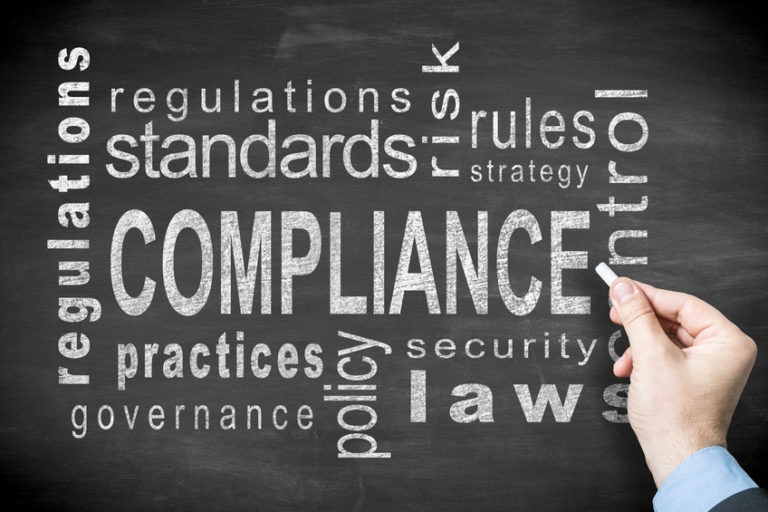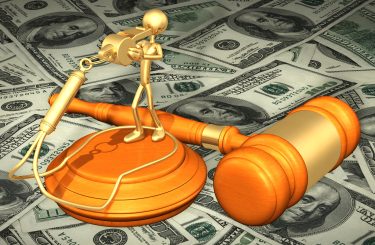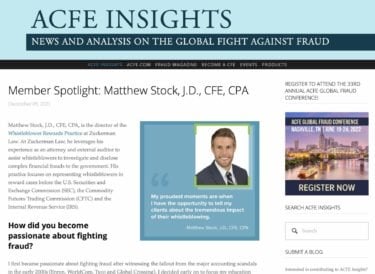
Increase in Accounting Fraud Whistleblower Tips

Contact us today to find out the strategies we have successfully employed to get awards for whistleblowers disclosing accounting fraud to the SEC.






According to the SEC Whistleblower Program’s 2020 Annual Report, a majority of whistleblowers tips submitted to the SEC each year relate to violations in corporate disclosures and financials (see examples of accounting violations in our Accounting Today article “The top 10 ways that companies cook the books,” which is also available here.):
- 2011: 51 corporate disclosures and financials tips
- 2012: 547 corporate disclosures and financials tips
- 2013: 557 corporate disclosures and financials tips
- 2014: 610 corporate disclosures and financials tips
- 2015: 687 corporate disclosures and financials tips
- 2016: 938 corporate disclosures and financials tips
- 2017: 954 corporate disclosures and financials tips
- 2018: 983 corporate disclosures and financials tips
- 2019: 1,107 corporate disclosures and financials tips
- 2020: 1,710 corporate disclosures and financials tips
A whistleblower providing original information about accounting fraud may be eligible to receive an award under the Dodd-Frank Act’s SEC Whistleblower Program. Even auditors and accountants are eligible to receive awards under the program.
If you have original information about accounting fraud that you would like to report to the SEC Whistleblower Office, contact the Director of our SEC whistleblower practice at [email protected] or call our leading SEC whistleblower lawyers at (202) 930-5901 or (202) 262-8959. All inquiries are confidential.
In conjunction with our courageous clients, our SEC whistleblower lawyers have helped the SEC halt multi-million dollar investment schemes, expose violations at large publicly traded companies, and return funds to defrauded investors.
Recently the Association of Certified Fraud Examiners published a profile of Matt Stock’s success working with whistleblowers to fight fraud:
See our article: How to Report Accounting Fraud and Earn an SEC Whistleblower Award.
SEC Whistleblower Program and Accounting Fraud

The SEC Whistleblower Program also protects the confidentiality of whistleblowers and does not disclose information that might directly or indirectly reveal a whistleblower’s identity. Whistleblowers can even submit a tip anonymously if represented by counsel.
In a 2016 keynote speech, the SEC Enforcement Director confirmed the SEC’s continued focus on issuer reporting and disclosure violations. To date, and as detailed in the SEC Division of Enforcement’s 2020 Annual Report, this focus has remained consistent:
“Integrity and accuracy in financial statements and issuer disclosures are critical to the functioning of our capital markets. During the last fiscal year, the Division maintained its ongoing focus on identifying and investigating securities laws violations involving different components of the financial reporting process.”
How to Qualify for an Accounting Fraud SEC Whistleblower Award
For more information about the SEC Whistleblower Program, see our eBook Tips from SEC Whistleblower Attorneys to Maximize an SEC Whistleblower Award. Click below to hear SEC whistleblower lawyer Matt Stock’s tips for SEC whistleblowers:
SEC Whistleblower Awards for Accounting Fraud Whistleblowers

If you have information that may qualify for an SEC whistleblower award, contact the Director of our SEC whistleblower practice at [email protected] or call our leading SEC whistleblower lawyers at (202) 930-5901 or (202) 262-8959.
All inquiries are confidential. In conjunction with our courageous clients, we have helped the SEC halt multi-million dollar investment schemes, expose violations at large publicly traded companies and return funds to defrauded investors.
Accounting Fraud and Abuses & SEC Enforcement Actions
Former SEC Chair Mary Jo White emphasized that [c]omprehensive, accurate, and reliable financial reporting is the bedrock upon which our markets are based, and is essential to ensuring public confidence in them.” As such, the SEC has increased the number of enforcement actions for accounting fraud and other accounting violations, including:
Improper Revenue Recognition
According to a Report Pursuant to Section 704 of the Sarbanes-Oxley Act of 2002, during the five years preceding the enactment of SOX, the “SEC brought the greatest number of actions [involving issuer financial-report violations] in the area of improper revenue recognition: 126 of the 227 enforcement matters involved such conduct, including the fraudulent reporting of fictitious sales, improper timing of revenue recognition, and improper valuation of revenue.” The following enforcement actions are examples of improper revenue recognition schemes that could qualify for an SEC award.
The SEC charged SMF Energy Corp. and its officers with accounting fraud for inflating revenues through a fraudulent billing scheme. According to the SEC’s complaint, the billing scheme “increased the amount of gallons of fuel invoiced beyond what was actually delivered to customers,” which resulted in false and misleading disclosures in the company’s SEC filings. The billing scheme circumvented SMF Energy’s internal accounting controls and led to, among other things, materially overstated revenues, profit margins, shareholders’ equity, and net income in its SEC filings.
The scheme resulted in several SEC violations, including the failure to maintain a system of internal controls sufficient to ensure that its customers were charged in accordance with their respective contracts, the failure to record revenues and liabilities in accordance with GAAP, and the failure to design (or to cause others to design) disclosure controls and procedures that would have caused the company to disclose and report that it recognized revenue from improper charges to customers. The SEC disgorged all ill-gotten profits and proceeds received as a result of the actions.
The SEC charged MedQuist with accounting fraud when it secretly inflated customer bills by increasing the number of lines of medical test that it purportedly transcribed. According to the SEC’s complaint, the “scheme was able to continue for several years because the unit of measure upon which bills to many customers were based . . . could not be verified by customers. Knowing that its customers were unable to verify line counts on bills, [MedQuist] . . . manipulate[d] line counts on customer bills to reach specific revenue and margin targets.” MedQuist and its Director, President, and Chief Operating Officer were charged with violating securities laws.
The SEC charged L3 for failing to maintain accurate books and records and failing to maintain adequate internal controls when the company improperly recorded $17.9M in revenue from a contract by creating invoices associated with unresolved claims that were not delivered when the revenue was recorded. According to the SEC’s order, employees “immediately reported concerns regarding potential violations of L3’s accounting policies and internal accounting controls to L3’s internal ethics department,” but the subsequent ethics review failed to uncover the misconduct due, in part, to “a failure by ethics investigators to adequately understand the billing process.”
The SEC charged IGI Inc. with fraudulent accounting practices and reporting, inadequate internal controls, and books-and-records violations for engaging in fraudulent sales-cutoff practices and other improper accounting practices. As a result of the improper sales-cutoff practices, “IGI misstated its assets, revenues, and net income” for several years.
The SEC charged Anicom Inc. and its directors with violating federal securities laws after the company falsely reported millions of dollars of nonexistent sales to inflate net income by more than $20M. According to the SEC’s complaint, Anicom included in its financial statements millions of dollars in sales to a fictitious customer, SCL Integration.
Tangoe paid $1.5 million to settle charges that it reported revenue prematurely for work that had not been performed and for transactions that did not produce any revenue at all. According to the complaint, the violations included: “1) counting customers’ prepayments for future services as current revenue; 2) improperly recording a loan from a business partner as revenue; 3) recording revenue in the wrong reporting periods; 4) prematurely recording revenue from contingent fee arrangements; 5) recording revenue from customers who were unlikely to pay; 6) violating the accounting rules for bad debt reserves; and 7) prematurely counting revenue from long-term contracts with ongoing obligations.”
Inadequate Internal Controls over Financial Reporting (ICFR)
On February 9, 2016, the SEC announced that Monsanto agreed to pay an $80 million penalty for inadequate internal accounting controls. According to the SEC’s order, the company failed to properly account for millions of dollars in rebates offered to retailers and distributors of Roundup after generic competition had undercut its prices and caused the company to lose significant share in the market. Monsanto booked substantial amounts of revenue from sales incentivized by the rebate program, but failed to recognize all of the related program costs at the same time. A whistleblower received a more than $22 million award for disclosing this fraud to the SEC.
Improper Accounting of Expenses
Penn West, a Canadian-based oil and gas company has agreed to pay $8.5 million in civil penalties for fraudulently moving hundreds of millions of dollars in expenses from operating expense accounts to capital expenditure accounts. This accounting fraud artificially reduced the company’s operating costs by as much as 20 percent in certain periods. The object of the scheme was to deceive investors about a key publicly reported metric concerning the cost of oil extraction and processing needed to sell a barrel of oil.
As alleged in the SEC’s complaint, Defendants engaged in three principal types of improper accounting practices in furtherance of their scheme:
- Defendants improperly moved certain expenses that had been recorded in Penn West’s operating expense accounts to its capital expenditure accounts, a reclassification practice known internally at Penn West as “reclass to capital.” This had the effect of moving the expenses from the company’s income statement, where they appeared as expenses, to the company’s balance sheet, where they appeared as assets, thus lowering the company’s reported operating expenses and making it appear that Penn West was investing capital in support of increased production.
- Defendants improperly moved certain operating expenses to Penn West’s royalty account, a line item on the company’s income statement intended to show money expended paying royalties to the owners of land on which Penn West drilled. This practice was referred to internally as “reclass to royalty.”
- Defendants improperly took excess operating expense amounts that had been accrued in prior accounting periods, but not expended, which should have been written off, and instead reduced those accruals in subsequent periods to reduce Penn West’s operating expenses and make them appear more consistent over the course of the year. This practice was referred to internally as “accrual softening.”
Channel-Stuffing
On April 27, 2015, the SEC obtained a $131 million judgment against Symbol Technologies Inc. for fraudulent revenue-recognition practices, including quarter-end “stuffing” of Symbol’s distribution channel to help meet revenue and earnings targets imposed by its CEO.
On August 4, 2004, Bristol-Myers Squibb agreed to pay a $150 million fine for selling excessive amounts of pharmaceutical products to its wholesalers ahead of demand in order to falsely inflate earnings. The channel-stuffing resulted in the company improperly recognizing revenue from $1.5 billion in sales to its two largest wholesalers. In addition, the SEC filed charges against two former Bristol-Myers officers for the fraudulent earnings management scheme.
For additional information, see our article on how to report channel stuffing and earn an SEC whistleblower award.
Fraudulent Management Estimates and “Cookie Jar” Reserves
On June 5, 2015, Computer Sciences Corporation agreed to pay $190 million to settle charges that the company engaged in a wide-range accounting-and-disclosure fraud that materially overstated its earnings and concealed from investors significant problems with its largest contract. According to the SEC’s order, the company’s former Finance Director prepared a fraudulent accounting model in which he included made-up assumptions to avoid reporting a negative hit to the company’s earnings. The company also overstated its earnings by using “cookie jar” reserves and by failing to record expenses as required.
Improper Post-Closing Entries
On September 27, 2016, Weatherford International agreed to pay a $140 million penalty to settle charges that it inflated its earnings by using deceptive income-tax accounting. According to the SEC’s order, Weatherford fraudulently lowered its year-end provision for income taxes each year so the company could better align its earnings results with its earlier-announced projections and analysts’ expectations. The company lowered its year-end provision for income taxes by making numerous post-closing adjustments to fill gaps and meet its previously disclosed effective tax rate.
Auditor-Independence Violations
On September 19, 2016, the SEC announced that public accounting firm Ernst & Young had agreed to pay $9.3 million to settle charges that two of the firm’s audit partners had “inappropriately close personal relationships” with their clients and thereby violated independence rules designed to ensure that firms maintain their objectivity and impartiality during audits. In one of the SEC’s orders, an EY audit partner was having a romantic relationship with a client’s Chief Accounting Officer. The main EY audit partner on the account noticed signs of this romantic relationship but failed to perform a reasonable inquiry. In the SEC’s second order, an audit partner was accused of excessive socializing with a client’s Chief Financial Officer. This socializing included attending sporting events, taking vacations, and incurring other significant entertainment expenses that did not serve a proper a business purpose.
Improper Asset Valuations
On August 6, 2015, Miller Energy Resources Inc. was charged with inflating values of oil and gas properties, resulting in misstated financial statements. According to the SEC’s order, the company overstated the properties’ value by more than $400 million as a result of the CFO’s relying on a reserve report that did not reflect fair value of the assets. In addition, the CFO double-counted $110 million of fixed assets already included in the reserve report.
Misleading Non-GAAP Financial Measures
Recently, the SEC issued new guidance on its interpretation of the rules and regulations on the use of non-GAAP financial measures. In a previous enforcement action, the SEC fined a company more than $1 million for misleading non-GAAP financial measures.
See more about deceptive non-GAAP financials in our article in Accounting Today: Deceptive non-GAAP financials will lead to future SEC whistleblower awards.
Retaliating Against Whistleblowers
On December 20, 2016, the SEC settled an internal-whistleblower retaliation claim with an Oklahoma energy company, SandRidge Energy Inc., for $1.4 million. According to the SEC order, the company used illegally restrictive separation agreements forbidding former employees from cooperating in SEC and other government investigations, and that SandRidge fired an employee who raised concerns about its accounting.
Largest Accounting Scandals
The table below identifies some of the largest SEC enforcement actions against companies for accounting fraud:
| Company | Monetary Sanctions | Violation |
|---|---|---|
| American Insurance Group (AIG) | $800 Million | Insurance company booked loans as revenue at an estimated $3.9 billion in accounting fraud and conspired to induce traders to inflate the prices of the stocks. |
| WorldCom | $750 Million | WorldCom inflated earnings by more than $11 billion and cost investors close to $200 billion. The deal reflects a civil penalty of $2.25 billion, which was reduced as part of the bankruptcy reorganization. |
| Fannie Mae | $350 Million | Fannie Mae “issued materially false and misleading financial statements in SEC filings and in various reports disseminated to investors.” |
| Time Warner | $300 Million | Time Warner engaged in securities fraud related to its accounting for online advertising revenue. It used “round-trip transactions” to inflate its online advertising revenue to hide the business slow down. |
| Qwest Communications | $250 Million | Qwest intentionally recognized over $3.8 billion in revenue and excluded $231 million in expenses that did not meet generally accepted accounting principles (GAAP) in an attempt to meet their predicted revenue and earnings projections. |
| Computer Associates | $225 Million | Computer Associates prematurely recognized over $3.3 billion in revenue by manipulating its quarter end cutoff dates to meet Wall Street’s quarterly earnings estimates. SEC’s Northeast Regional Office Director Schonfeld compared it to a team “that plays on after the final whistle has blown … until it had all the points it needed to make every quarter look like a win.” |
| Panasonic Corp | $143 Million | Panasonic overstated pre-tax and net income by prematurely recognizing more than $82 million in revenue by backdating an agreement with an airline. Additionally, Panasonic “lacked sufficient internal accounting controls and failed o make and keep accurate books and records in connection with purported consultant retained by PAC.” |
| Weatherford | $140 Million | Weatherford inflated earnings by using deceptive income tax accounting which included an international tax avoidance structure that reduced its effective tax rate (ETR) and tax expense. False financial statements inflated earnings by over $900 million. |
| Healthsouth | $100 Million | Shortly after Healthsouth went public in 1986, it began to “artificially inflate its earnings to meet Wall Street analysts’ expectations and maintain the market price.” Since 1999, it overstated its earnings by over $1.4 billion. |
| Lehman Brothers | $80 Million | Lehman intentionally manipulated their accounting reports through numerous Repo105 transactions that hid their actual debt. When they declared bankruptcy they were $615 billion in debt. |
Accounting Fraud SEC Whistleblower Lawyers
Leading SEC whistleblower law firm Zuckerman Law represents whistleblowers worldwide before the SEC under the Dodd-Frank SEC Whistleblower Program. The firm has a licensed Certified Public Accountant and Certified Fraud Examiner on staff to enhance its ability to investigate and disclose complex financial fraud to the SEC, and two of the firm’s attorneys served in high-level positions at a government agency that protects whistleblowers. Firm Principal Jason Zuckerman has been named by Washingtonian Magazine as a “Top Whistleblower Lawyer” and the firm has been ranked by U.S. News as a Tier 1 Firm in Labor & Employment Litigation.
Whistleblower law firm Zuckerman Law has substantial experience investigating securities fraud schemes and preparing effective submissions to the SEC concerning a wide range of federal securities violations, including:
- Accounting fraud;
- Investment and securities fraud;
- Insider trading;
- Foreign bribery and other FCPA violations;
- EB-5 investment fraud;
- Manipulation of a security’s price or volume;
- Fraudulent securities offerings and Ponzi schemes;
- Hedge fund fraud;
- Unregistered securities offerings;
- Investment adviser fraud;
- Broker-dealer anti-money laundering program violations;
- False or misleading statements about a company or investment;
- Inadequate internal controls;
- Deceptive non-GAAP financials;
- Improper revenue recognition;
- Violations of auditor independence rules;
- Misleading or incomplete cybersecurity disclosures; and
- Blockchain fraud.
To schedule a free preliminary confidential case review with the SEC whistleblower attorneys at Zuckerman Law, click here or call us at 202-262-8959.
Process to Obtain SEC Whistleblower Award for Reporting Accounting Fraud
SEC Whistleblower Protections for Disclosures of Accounting Fraud
The SOX whistleblower lawyers at Zuckerman Law represent accountants in whistleblower retaliation claims, including claims brought under the whistleblower protection provision of the Sarbanes-Oxley Act and the Dodd-Frank Act.
The whistleblower protection provision of the Sarbanes-Oxley Act provides robust protection to corporate whistleblowers, and indeed some SOX whistleblowers have achieved substantial recoveries.
Leading SOX whistleblower law firm Zuckerman Law issued a free guide to the SOX whistleblower protection law: Sarbanes-Oxley Whistleblower Protection: Robust Protection for Corporate Whistleblowers. The guide summarizes SOX whistleblower protections and offers concrete tips for corporate whistleblowers based on lessons learned during years of litigating SOX whistleblower cases.
See our column in Going Concern: Sarbanes-Oxley 15 Years Later: Accountants Need to Speak Up Now More Than Ever.
Accounting Fraud SEC Whistleblower Rewards
whistleblower_lawyers_012017_infographic
Transcript: As a former external auditor, I’m well-aware of the pressures that are involved with auditors and accountants. Especially when an SEC filing date is coming up. Perhaps there will be disagreements with clients or disagreements about a specific number in the financial statements.
Luckily for accountants and auditors there are many new lays that have been enacted that offer protections and incentives for raising reasonable concerns. Under the Sarbanes-Oxley Act and Dodd-Frank Act employees are protected against retaliation from their employer if they raise reasonable concerns about one of these violations.
In addition, in certain circumstances auditors and accountants may even qualify for an SEC whistleblower award for raising concerns about violations of federal securities laws.





